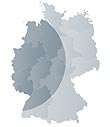Western Germany

Western Germany (German: Westdeutschland) is a region in the west of Germany. The exact area defined by the term is not constant, but it usually includes North Rhine-Westphalia. The Saarland and Rhineland-Palatinate are also sometimes included but are usually considered Southwestern Germany. Hesse is often considered as Central Germany (together with Thuringia).
West of the Harz in Central Germany, or the line between the cities of Hamburg and Munich, is the western part, but again, these distinctions must only be considered very loosely, especially, not in a political sense.
Politically, Germans often still identify the term Westdeutschland with the Bonn Republic, the Cold War-era West Germany. Therefore, the English-language distinction between "West Germany" and "Western Germany" is rarely made in German. However, the latter can be specified as der Westen Deutschlands, "the West of Germany."
Major cities
Where a city has different names in English and German, the English name is given first.
| State capital |
| Rank | City | Pop. 1950 |
Pop. 1960 |
Pop. 1970 |
Pop. 1980 |
Pop. 1990 |
Pop. 2000 |
Pop. 2010 |
Area [km²] |
Density per km² |
Growth [%] (2000– 2010) |
surpassed 100,000 |
State (Bundesland) |
|---|---|---|---|---|---|---|---|---|---|---|---|---|---|
| 1. | | 594,941 | 801,142 | 849,451 | 976,694 | 953,551 | 962,884 | 1,007,119 | 405,17 | 2,486 | 4.59 | 1852 | |
| 2. | | 532,037 | 675,009 | 666,179 | 629,375 | 644,865 | 648,550 | 679,664 | 248,31 | 2,737 | 4.80 | 1875 | |
| 3. | | 500,516 | 697,891 | 660,963 | 590,479 | 575,794 | 569,364 | 588,735 | 217,22 | 2,710 | 3.40 | 1882 | |
| 4. | | 507,349 | 640,802 | 640,642 | 608,297 | 599,055 | 588,994 | 580,444 | 280,71 | 2,068 | −1.45 | 1894 | |
| 5. | | 605,411 | 729,462 | 696,419 | 647,643 | 626,973 | 595,243 | 574,635 | 210,32 | 2,732 | −3.46 | 1896 | |
| 6. | | 410,783 | 503,641 | 452,721 | 558,089 | 535,447 | 514,915 | 489,599 | 232,83 | 2,103 | −4.92 | 1904 | |
| 7. | | 289,804 | 362,490 | 343,809 | 400,757 | 396,486 | 391,147 | 374,737 | 145,66 | 2,573 | −4.20 | 1904 | |
| 8. | | 363,224 | 421,378 | 417,694 | 393,381 | 383,660 | 366,434 | 349,721 | 168,39 | 2,077 | −4.56 | 1884 | |
| 9. | | 115,394 | 146,889 | 275,722 | 288,148 | 292,234 | 302,247 | 324,899 | 141,22 | 2,301 | 7.49 | 1934 | |
| 10. | | 153,613 | 174,527 | 168,609 | 312,708 | 319,037 | 321,758 | 323,270 | 257,92 | 1,253 | 0.47 | 1930 | |
| 11. | | 118,496 | 180,871 | 198,878 | 269,696 | 259,438 | 265,609 | 279,803 | 302,96 | 924 | 5.34 | 1915 | |
| 12. | | 220,741 | 257,293 | 250,715 | 274,464 | 260,301 | 270,109 | 275,976 | 203,93 | 1,353 | 2.17 | 1905 | |
| 13. | | 129,811 | 170,367 | 175,451 | 243,947 | 241,861 | 244,386 | 258,664 | 160,84 | 1,608 | 5.84 | 1888 | |
| 14. | | 124,879 | 152,414 | 151,085 | 258,424 | 259,436 | 263,014 | 257,993 | 170,45 | 1,514 | −1.91 | 1921 | |
| 15. | | 315,460 | 388,608 | 347,074 | 304,386 | 293,714 | 278,695 | 257,981 | 104,94 | 2,458 | −7.43 | 1903 | |
| Rank | City | Pop. 1950 |
Pop. 1960 |
Pop. 1970 |
Pop. 1980 |
Pop. 1990 |
Pop. 2000 |
Pop. 2010 |
Area [km²] |
Density per km² |
Growth [%] (2000– 2010) |
surpassed 100,000 |
State (Land) |